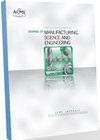基于强化学习的多产品柔性制造系统中的自适应移动机器人调度
IF 2.4
3区 工程技术
Q3 ENGINEERING, MANUFACTURING
Journal of Manufacturing Science and Engineering-transactions of The Asme
Pub Date : 2023-07-11
DOI:10.1115/1.4062941
引用次数: 0
摘要
工业4.0和工业人工智能的最新进展使移动机器人在柔性制造系统的材料处理中的集成成为可能。然而,由于车间环境的不断变化、复杂和不确定性,有效地实时调度这些机器人仍然是一个挑战。因此,本文研究了多产品柔性生产线的机器人调度问题,该生产线使用移动机器人在机器和缓冲器之间装载/卸载零件。该问题被公式化为马尔可夫决策过程,并使用Q学习算法为机器人在处理不同产品类型时的运动找到最优策略。使用基于永久生产损失和需求不满足成本的奖励函数来评估系统的性能。通过一个数值案例研究验证了所提出的方法,该研究将所得策略与先到先得的策略进行了比较,表明生产吞吐量显著提高了约23%。本文章由计算机程序翻译,如有差异,请以英文原文为准。
Adaptive Mobile Robot Scheduling in Multiproduct Flexible Manufacturing Systems Using Reinforcement Learning
The integration of mobile robots in material handling in flexible manufacturing systems is made possible by the recent advancements in Industry 4.0 and industrial artificial intelligence. However, effectively scheduling these robots in real-time remains a challenge due to the constantly changing, complex and uncertain nature of the shop floor environment. Therefore, this paper studies the robot scheduling problem for a multiproduct flexible production line using a mobile robot for loading/unloading parts among machines and buffers. The problem is formulated as a Markov Decision Process and the Q-learning algorithm is used to find an optimal policy for the robot's movements in handling different product types. The performance of the system is evaluated using a reward function based on permanent production loss and the cost of demand dissatisfaction. The proposed approach is validated through a numerical case study that compares the resulting policy to a first-come-first-served policy, showing a significant improvement in production throughput of approximately 23%.
求助全文
通过发布文献求助,成功后即可免费获取论文全文。
去求助
来源期刊
CiteScore
6.80
自引率
20.00%
发文量
126
审稿时长
12 months
期刊介绍:
Areas of interest including, but not limited to: Additive manufacturing; Advanced materials and processing; Assembly; Biomedical manufacturing; Bulk deformation processes (e.g., extrusion, forging, wire drawing, etc.); CAD/CAM/CAE; Computer-integrated manufacturing; Control and automation; Cyber-physical systems in manufacturing; Data science-enhanced manufacturing; Design for manufacturing; Electrical and electrochemical machining; Grinding and abrasive processes; Injection molding and other polymer fabrication processes; Inspection and quality control; Laser processes; Machine tool dynamics; Machining processes; Materials handling; Metrology; Micro- and nano-machining and processing; Modeling and simulation; Nontraditional manufacturing processes; Plant engineering and maintenance; Powder processing; Precision and ultra-precision machining; Process engineering; Process planning; Production systems optimization; Rapid prototyping and solid freeform fabrication; Robotics and flexible tooling; Sensing, monitoring, and diagnostics; Sheet and tube metal forming; Sustainable manufacturing; Tribology in manufacturing; Welding and joining

 求助内容:
求助内容: 应助结果提醒方式:
应助结果提醒方式:


